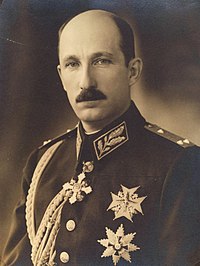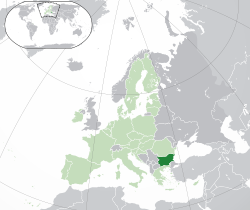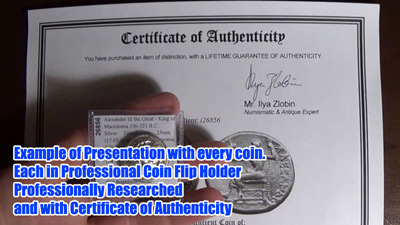Bulgaria
Boris III - Tsar of Bulgaria: 3 October 1918 – 28 August
1943
1930 Silver 100 Leva 34mm (19.80 grams) 0.500
Silver (0.3194 oz. ASW)
Reference: KM# 43 | Engraver: Lajos Berán
БОРИСЪ III ЦАРЬнаБЪЛГАРИТѢ ∙L∙BERÁN BP., Tsar of Bulgaria, head left.
100 ЛЕВА 1930, Denomination above date within wreath.
Edge Lettering:
БОЖЕ ПАЗИ БЪЛГАРИЯ
You are bidding on the exact item pictured, provided with a Certificate of
Authenticity and Lifetime Guarantee of Authenticity.
 Boris
III, Tsar of Bulgaria (30 January [O.S. 18 January] 1894 - 28 August
1943), originally Boris Klemens Robert Maria Pius Ludwig Stanislaus Xaver
(Boris Clement Robert Mary Pius Louis Stanislaus Xavier), son of
Ferdinand I , came to the throne in 1918 upon the abdication of his father,
following the defeat of the Kingdom of Bulgaria during World War I. This was
the country's second major defeat in only five years, after the disastrous
Second Balkan War (1913). Under the Treaty of Neuilly , Bulgaria was forced
to cede new territories and pay crippling reparations to its neighbours,
thereby threatening political and economic stability. Two political forces,
the Agrarian Union and the Communist Party, were calling for the
overthrowing of the monarchy and the change of the government. It was in
these circumstances that Boris succeeded to the throne. He distinguished
himself during the Second World War by opposing attempts by Adolf Hitler to
deport the Jewish population of his country. Boris
III, Tsar of Bulgaria (30 January [O.S. 18 January] 1894 - 28 August
1943), originally Boris Klemens Robert Maria Pius Ludwig Stanislaus Xaver
(Boris Clement Robert Mary Pius Louis Stanislaus Xavier), son of
Ferdinand I , came to the throne in 1918 upon the abdication of his father,
following the defeat of the Kingdom of Bulgaria during World War I. This was
the country's second major defeat in only five years, after the disastrous
Second Balkan War (1913). Under the Treaty of Neuilly , Bulgaria was forced
to cede new territories and pay crippling reparations to its neighbours,
thereby threatening political and economic stability. Two political forces,
the Agrarian Union and the Communist Party, were calling for the
overthrowing of the monarchy and the change of the government. It was in
these circumstances that Boris succeeded to the throne. He distinguished
himself during the Second World War by opposing attempts by Adolf Hitler to
deport the Jewish population of his country.
Boris was born on 30
January 1894 in Sofia . He was the first son of Prince Ferdinand of Bulgaria
and his wife Princess Marie Louise . In February 1896 his father paved
the way for the reconciliation of Bulgaria and Russia with the conversion of
the infant Prince Boris from Roman Catholicism to Eastern Orthodox
Christianity , a move that earned Ferdinand the frustration of his wife, the
animosity of his Catholic Austrian relatives (particularly that of his
uncle, Franz Joseph I of Austria ) and excommunication from the Catholic
Church. In order to remedy this difficult situation Ferdinand christened all
his remaining children as Catholics. Nicholas II of Russia stood as
godfather to Boris and met the young boy during Ferdinand's official visit
to Saint Petersburg in July 1898. He received his initial education in
the so-called Palace Secondary School which Ferdinand created in 1908 solely
for his sons. Later, Boris graduated from the Military School in Sofia ,
then took part in the Balkan Wars . During the First World War he served as
liaison officer of the General Staff of the Bulgarian Army on the Macedonian
front . In 1916 he was promoted to colonel and attached again as liaison
officer to Army Group Mackensen and the Bulgarian Third Army for the
operations against Romania . Boris worked hard to smooth the sometimes
difficult relations between Field Marshal Mackensen and the commander of the
3rd army Lieutenant General Stefan Toshev . Through his courage and personal
example he earned the respect of the troops and the senior Bulgarian and
German commanders, even that of the Generalquartiermeister of the German
Army Erich Ludendorff , who preferred dealing personally with Boris and
described him as excellently trained, a thoroughly soldierly person and
mature beyond his years. In 1918 Boris was made a major general and with the
abdication of his father acceded to the throne as Tsar Boris III on 3
October 1918. One year after Boris's accession, Aleksandar
Stamboliyski (or Stambolijski) of the Bulgarian People's Agrarian
Union was elected prime minister. Though popular with the large peasant
class, Stambolijski earned the animosity of the middle class and military,
which led to his toppling in a military coup on 9 June 1923, and his
subsequent assassination. On 14 April 1925 an anarchist group attacked
Boris's cavalcade as it passed through the Arabakonak Pass. Two days later a
bomb killed 150 members of the Bulgarian political and military elite in
Sofia as they attended the funeral of a murdered general (see St Nedelya
Church assault ). Following a further attempt on Boris's life the same year
military reprisals killed several thousand communists and agrarians,
including representatives of the intelligentsia. Finally, in October 1925,
there was a short border war with Greece, known as the Incident at Petrich ,
which was resolved with the help of the League of Nations . In the
coup on 19 May 1934 , the Zveno military organisation established a
dictatorship and abolished the political parties in Bulgaria. King Boris was
reduced to the status of a puppet king as a result of the coup. The
following year, he staged a counter-coup and assumed control of the country
by establishing a regime loyal to him. The political process was controlled
by the Tsar, but a form of parliamentary rule was re-introduced, without the
restoration of the political parties. With the rise of the "King's
government" in 1935, Bulgaria entered an era of prosperity and astounding
growth, which deservedly qualify it as the Golden Age of the Third Bulgarian
Kingdom. It lasted nearly five years. Boris married Giovanna of Italy
, daughter of Victor Emmanuel III of Italy , first in a Catholic ceremony in
Assisi , Italy in October 1930 (attended by Benito Mussolini ), and then at
an Orthodox ceremony in Sofia. The marriage produced a daughter, Maria
Louisa , in January 1933, and a son and heir to the throne, Simeon , in
1937.

Bulgaria (Bulgarian: България, tr. Bǎlgariya), officially the
Republic of Bulgaria (Bulgarian: Република България, tr. Republika
Bǎlgariya, IPA: [rɛˈpublikɐ bɐɫˈɡarijɐ]), is a country in southeastern
Europe. It is bordered by Romania to the north, Serbia and Macedonia to the
west, Greece and Turkey to the south, and the Black Sea to the east. With a
territory of 110,994 square kilometres (42,855 sq mi), Bulgaria is Europe's
16th-largest country.  Organised
prehistoric cultures began developing on current Bulgarian lands during the
Neolithic period. Its ancient history saw the presence of the Thracians,
Ancient Greeks, Persians, Celts, Romans, Goths, Alans and Huns. The
emergence of a unified Bulgarian state dates back to the establishment of
the First Bulgarian Empire in 681 AD, which dominated most of the Balkans
and functioned as a cultural hub for Slavs during the Middle Ages. With the
downfall of the Second Bulgarian Empire in 1396, its territories came under
Ottoman rule for nearly five centuries. The Russo-Turkish War of 1877-78 led
to the formation of the Third Bulgarian State. The following years saw
several conflicts with its neighbours, which prompted Bulgaria to align with
Germany in both world wars. In 1946 it became a one-party socialist state as
part of the Soviet-led Eastern Bloc. In December 1989 the ruling Communist
Party allowed multi-party elections, which subsequently led to Bulgaria's
transition into a democracy and a market-based economy. Organised
prehistoric cultures began developing on current Bulgarian lands during the
Neolithic period. Its ancient history saw the presence of the Thracians,
Ancient Greeks, Persians, Celts, Romans, Goths, Alans and Huns. The
emergence of a unified Bulgarian state dates back to the establishment of
the First Bulgarian Empire in 681 AD, which dominated most of the Balkans
and functioned as a cultural hub for Slavs during the Middle Ages. With the
downfall of the Second Bulgarian Empire in 1396, its territories came under
Ottoman rule for nearly five centuries. The Russo-Turkish War of 1877-78 led
to the formation of the Third Bulgarian State. The following years saw
several conflicts with its neighbours, which prompted Bulgaria to align with
Germany in both world wars. In 1946 it became a one-party socialist state as
part of the Soviet-led Eastern Bloc. In December 1989 the ruling Communist
Party allowed multi-party elections, which subsequently led to Bulgaria's
transition into a democracy and a market-based economy.

Bulgaria's population of 7.2 million people is predominantly urbanised and
mainly concentrated in the administrative centres of its 28 provinces. Most
commercial and cultural activities are centred on the capital and largest
city, Sofia. The strongest sectors of the economy are heavy industry, power
engineering, and agriculture, all of which rely on local natural resources.
The country's current political structure dates to the adoption of a
democratic constitution in 1991. Bulgaria is a unitary parliamentary
republic with a high degree of political, administrative, and economic
centralisation. It is a member of the European Union, NATO, and the Council
of Europe; a founding state of the Organization for Security and
Co-operation in Europe (OSCE); and has taken a seat at the UN Security
Council three times.
|


 Boris
III, Tsar of Bulgaria (30 January [O.S. 18 January] 1894 - 28 August
1943), originally Boris Klemens Robert Maria Pius Ludwig Stanislaus Xaver
(Boris Clement Robert Mary Pius Louis Stanislaus Xavier), son of
Ferdinand I , came to the throne in 1918 upon the abdication of his father,
following the defeat of the Kingdom of Bulgaria during World War I. This was
the country's second major defeat in only five years, after the disastrous
Second Balkan War (1913). Under the Treaty of Neuilly , Bulgaria was forced
to cede new territories and pay crippling reparations to its neighbours,
thereby threatening political and economic stability. Two political forces,
the Agrarian Union and the Communist Party, were calling for the
overthrowing of the monarchy and the change of the government. It was in
these circumstances that Boris succeeded to the throne. He distinguished
himself during the Second World War by opposing attempts by Adolf Hitler to
deport the Jewish population of his country.
Boris
III, Tsar of Bulgaria (30 January [O.S. 18 January] 1894 - 28 August
1943), originally Boris Klemens Robert Maria Pius Ludwig Stanislaus Xaver
(Boris Clement Robert Mary Pius Louis Stanislaus Xavier), son of
Ferdinand I , came to the throne in 1918 upon the abdication of his father,
following the defeat of the Kingdom of Bulgaria during World War I. This was
the country's second major defeat in only five years, after the disastrous
Second Balkan War (1913). Under the Treaty of Neuilly , Bulgaria was forced
to cede new territories and pay crippling reparations to its neighbours,
thereby threatening political and economic stability. Two political forces,
the Agrarian Union and the Communist Party, were calling for the
overthrowing of the monarchy and the change of the government. It was in
these circumstances that Boris succeeded to the throne. He distinguished
himself during the Second World War by opposing attempts by Adolf Hitler to
deport the Jewish population of his country.
 Organised
prehistoric cultures began developing on current Bulgarian lands during the
Neolithic period. Its ancient history saw the presence of the Thracians,
Ancient Greeks, Persians, Celts, Romans, Goths, Alans and Huns. The
emergence of a unified Bulgarian state dates back to the establishment of
the First Bulgarian Empire in 681 AD, which dominated most of the Balkans
and functioned as a cultural hub for Slavs during the Middle Ages. With the
downfall of the Second Bulgarian Empire in 1396, its territories came under
Ottoman rule for nearly five centuries. The Russo-Turkish War of 1877-78 led
to the formation of the Third Bulgarian State. The following years saw
several conflicts with its neighbours, which prompted Bulgaria to align with
Germany in both world wars. In 1946 it became a one-party socialist state as
part of the Soviet-led Eastern Bloc. In December 1989 the ruling Communist
Party allowed multi-party elections, which subsequently led to Bulgaria's
transition into a democracy and a market-based economy.
Organised
prehistoric cultures began developing on current Bulgarian lands during the
Neolithic period. Its ancient history saw the presence of the Thracians,
Ancient Greeks, Persians, Celts, Romans, Goths, Alans and Huns. The
emergence of a unified Bulgarian state dates back to the establishment of
the First Bulgarian Empire in 681 AD, which dominated most of the Balkans
and functioned as a cultural hub for Slavs during the Middle Ages. With the
downfall of the Second Bulgarian Empire in 1396, its territories came under
Ottoman rule for nearly five centuries. The Russo-Turkish War of 1877-78 led
to the formation of the Third Bulgarian State. The following years saw
several conflicts with its neighbours, which prompted Bulgaria to align with
Germany in both world wars. In 1946 it became a one-party socialist state as
part of the Soviet-led Eastern Bloc. In December 1989 the ruling Communist
Party allowed multi-party elections, which subsequently led to Bulgaria's
transition into a democracy and a market-based economy.

